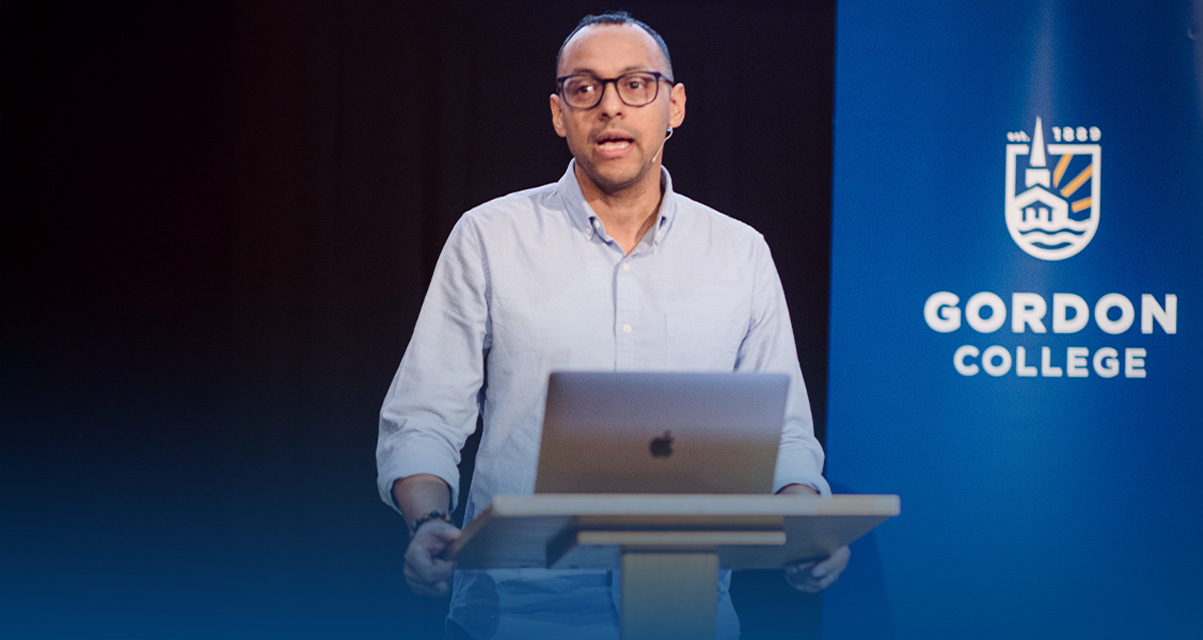Rich Villodas on the Power of Faith: How to Find Peace in Anxiety
According to Rich Villados, pastor of New Life Fellowship Church of Queens, NY, anxiety isn’t just excessive worry or concern. It’s an automatic response to a real or perceived threat that can manifest itself in anger, avoidance and other physical or emotional responses.
Often, anxious feelings come as a result of new experiences or disagreements between people we interact with. And when anxiety arises a common reaction is to withdraw and disengage. But Villodas urged listeners at a recent Gordon College Center for Faith and Inquiry event to reflect Christ’s example of abiding in God to help us move from anxiety-driven responses towards a principle-driven presence.
Creating Environments for Self-Differentiation: Distinction Without Disconnect
To manage our anxiety we have to understand ourselves first. Villados drew on the family systems model to explain the concept of self-differentiation. Within a family you’re joined to a group of people, but you have your own distinct interests, ideas and sometimes even values. You are your own person, but you are connected to others through your family.
Applying this concept of self-differentiation to our relationships can help us manage automatic, anxious responses. Villodas explained that there’s a difference between emotional fusion, where we lose ourselves in others and our emotional connections to them, and emotional cutoff, where we abandon contact with those who are different from us.
Villodas also explained how the body’s automatic responses can be used for good. “Anxiety is a gift from God to react to protect ourselves,” Villados said. “There are times for contemplation and anxiety.”
We must learn to both healthily separate and healthily attach to those who are different from us by setting healthy boundaries rooted in principle, not in reactivity. In making distinctions from others without disconnection, we begin to cultivate a calm presence and a curiosity for closeness.
“It’s a lifelong journey of remaining close to God, ourselves and each other during times of high anxiety,” Villodas said, “where we remain connected to people without having our reaction or behavior determined by them.”
Abiding in Jesus, Connecting with Others
“To live as someone with differentiation, we have to have a contemplative life with God. I’m not talking about living according to principle. I’m talking about [having] principles in our convictions, in a way that holds on to grace and truth, to move beyond reactivity, into presence,” Villados explained.
God’s word must be an active presence in our lives for us to truly grow in empathy, self-differentiation and anxiety management. We must learn to “abide” in Christ—to remain, stay, dwell, continue and be present in relationship with God. Villodas pointed out this phrase is used by Jesus says “abide” 15 times in John’s Gospel and 64 times throughout all of John’s books. Its repeated use emphasizes our need to spend time in the presence of God, learning from Scripture and experiencing life with others.
Once we have a strong sense of self in Christ, we can create environments where disagreements do not automatically lead to disconnection. Villodas used the examples of Matthew the tax collector and Simon the Zealot, who were both disciples of Jesus despite their vast differences. Matthew was considered a traitor to the Jewish people because he collected money for the Romans, and it made him rich; Simon was trained to kill people like Matthew in rebellion against Rome and was a commoner.
“It is possible within this particular space to see others as made in the image of God, to honor their presence, to live with great curiosity,” said Villodas. “It doesn’t mean watering down the truth; it means holding together this prophetic calling that we have between grace and truth.”
Drawing Close to God
To put this into practice, Villodas offered a few practical measures to evaluate if we’re growing toward self-differentiation: Are you able to speak up for yourself? Are you curious to listen to others who differ from you? And ultimately, are you growing in empathy and not avoiding hard, necessary conversations? By periodically asking ourselves such questions, we can reflect on our reactions and identify areas of personal growth.
“If there’s any group of people that are to model this before the world, it’s the followers of Jesus,” he said in closing. “Not people who don’t have conditions and principles and values, but people who are led by the fruit of the Spirit, people who are able to hold together grace and truth. The Church is supposed to be the kind of community that shows the world [this kind of peace is] possible.”
 The Bell
The Bell